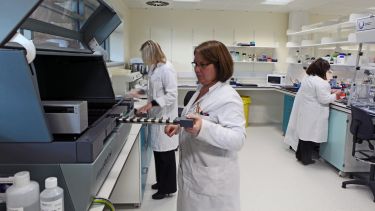Pioneering advanced therapeutics to give hope to patients and their families
Banner hidden
Unravelling the causes of neurodegenerative conditions.
Identifying effective therapies that could actually reduce disability.
This is the future.
And it will be Sheffield made.
Researchers at the University of Sheffield are pioneering advanced therapeutics to give hope to patients and their families
Advanced therapies signal a new era of medicine. For the first time we have the potential to offer much-needed treatments for devastating neurological diseases that cannot be treated by conventional drug compounds.
In partnership with Sheffield Teaching Hospitals NHS Trust our world-class team is driving experimental science into international clinical trials to combat devastating neurodegenerative diseases and transform millions of lives.
To stay up to date with the latest world-changing advances from the University of Sheffield, sign up to receive our briefing.
Pioneering stem cell therapy for multiple sclerosis
Colette Beecher, was diagnosed with Multiple Sclerosis (MS) in January 2011, and has been relapse free for 5 years after having the MS stem cell transplantation at Sheffield's Royal Hallamshire Hospital in April 2016.
"Several of my symptoms have now disappeared – I no longer get spasms that go down my spine when I flex my head forward, and my right leg hasn't given way for three years."
A recent MRI scan showed she had no signs of the active disease and clinically she has had no further relapses since receiving this treatment. “I now have the possibility of living a life without MS and contemplating a future without disability. This is a future that this treatment has given me."A team from Sheffield Teaching Hospitals NHS Foundation Trust led by two University of Sheffield Honorary Professors, are pioneering a breakthrough treatment for multiple sclerosis. The autologous haematopoietic stem cell transplant (AHSCT) team is the first study to significantly reverse disability in certain patients with MS.
The published findings of the first randomised controlled trial in this field confirm the global impact of this treatment on patients with severe inflammatory MS. The trial showed that AHSCT stabilised the disease and reduced the level of disability to levels never previously seen before in research trials investigating new and emerging treatments for MS.
So far the treatment has had a life-changing impact on patients who have the relapsing remitting form of the disease. Many regained their ability to walk, run and even dance as a result.
Trialling a genetic therapy treatment for Motor Neurone Disease
The University of Sheffield with Sheffield Teaching Hospitals NHS Foundation Trust is the only site in the UK to have participated in an international clinical trial for an investigational drug in people with a form of motor neurone disease (MND).
Two percent of all MND cases are caused by a mutation in the SOD1 gene. The gene therapy team in Sheffield provided scientific evidence that gene silencing could stop some of the damaging effects of this gene mutation.
Encouraging results from phase one and two of the study were published in the New England Journal of Medicine. The results of the phase three clinical are due to be published in the coming weeks and work to investigate how to lower the levels of the toxic SOD1 protein in patients will continue at Sheffield.
Paving the way for the treatment of Alzheimer’s Disease using genetic therapies
Neurological researchers are investigating the benefits of using advanced gene-therapies to treat people with Alzheimer’s Disease.
A worldwide clinical research trial is underway, developed by IONIS pharmaceuticals in collaboration with scientists at Washington University and supported by dedicated researchers at the University of Sheffield. The trial is based on successful results from preclinical tests, which showed that antisense oligonucleotide therapies (ASO) effectively reduced symptoms and behaviours of the disease.
This trial offers a promising alternative to current medications by targeting the source of the disease within DNA rather than treating the symptoms and behaviours. This has the potential to significantly improve the quality of life for patients.



